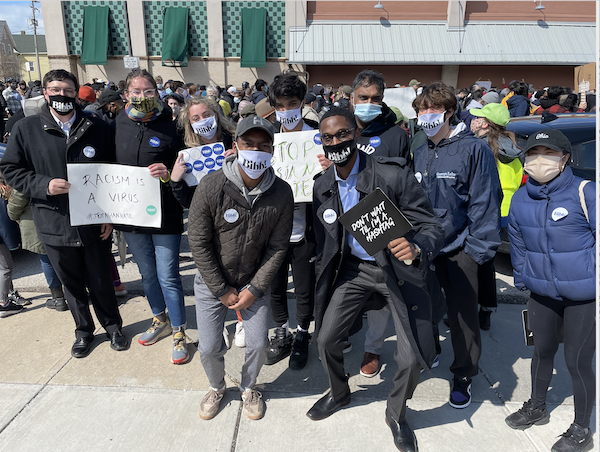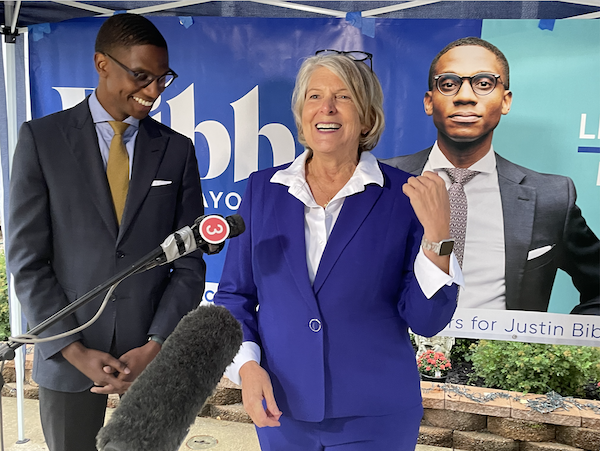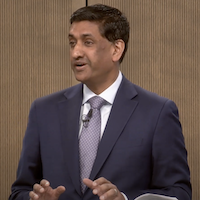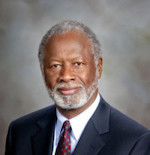Candidate has been building relationships, studying in and out of systems for nearly two decades in mayoral bid
Editor’s Note:
This column owes its genesis to Cleveland city councilman Basheer Jones, the one-term Hough area councilman who ran for mayor in this year’s primary, won a few east side wards, but essentially ran a campaign that had no chance to break out of the box.
Shortly after the primary, Jones threw his lot in with council president Kevin Kelley, who came in second to Justin Bibb in the primary. Jones began to ask repeatedly out loud, “Who is Justin Bibb?”
We thought it a good question, though not for the reasons that Jones seemed to insinuate.
So we contacted the Bibb camp and arranged for a one-on-one sit-down. It took place Oct. 11 in the candidate’s spare Midtown headquarters. When we arrived at 7:30a, the candidate was already there, busy on his phone. We recorded the conversation, which ran just over 45 minutes. We had advised his campaign manager that we’d heard enough about his policies and plans but wanted a sense of the man behind those positions to emerge. Bibb’s team welcomed the approach.
Afterwards, we felt we should extend the same opportunity to the Kelley camp. We reached out several times through paid staffers on the Kelley team. We were unable to secure a commitment, and time has run out.
A word about the format of this interview. Form has followed function. Our objective was to give voters a sense of the answer to Basheer’s question, and to do it in as unfiltered a way as we could. We had a series of questions prepared that were designed to provoke thought, not elicit canned answers or policy positions. What follows below is a combination of conversation, reporting, and hopefully some perspective taking.
If you want a quick read, focus on the words in bold, they are Bibb’s. Bold = Bibb.
• • •

Bibb has been speaking with voters in small groups and one on one since before his January 2021 official campaign launch.
We eased into our conversation with candidate Bibb by gleaning some basic information about his personality and his life. We learned his favorite meal is a short rib dinner from Mt. Pleasant Barbecue with extra sauce on everything. Notwithstanding his affinity for Notorious B.I.G., he is something of an old soul, musically and otherwise. He digs Miles Davis, and his R&B faves are inherited from his father, who always seemed to have Stevie Wonder on in the car. He is something of a neat freak and his favorite alcoholic beverage is an Old Fashioned.
He’s a reader of course. On his nightstand he’s working his way through Bloomberg by Bloomberg, a memoir by the businessman and former New York City mayor. He’s also struggling to find the time to finish Caste by Isabel Wilkerson, which he said would have to wait until after the campaign.
Bibb resides in Playhouse Square and has been a Ward 3 resident for the past seven years. He loves his downtown neighborhood but he also appreciates the quiet, the history, and the view that Lakeview Cemetery afford.
Two words he picked to describe himself were energetic and extrovert. His friends from childhood used to ask him if he ever sat still. He has been a man on a mission ever since high school, moving with purpose and urgency but not haste.
We ventured a question about his amorous inclinations — after he mentioned his childhood crush on Faith, a Mt. Pleasant memory — by asking about a reported beauty who accompanied him to a Boule event in the summer. She lives in DC, we were told, and the possibility of a closer relationship would have to await the completion of the campaign.
• • •

Bibb has worked to build new alliances all across town
Bibb won the primary against a much more experienced field despite being a “political unknown” in a crowded primary that contained five past or present elected officials who collectively have won almost as many political campaigns as he has completed years on this planet. At 34, Bibb is young, energetic, highly focused, disciplined, driven, engaging, studious, straightforward and direct, self-aware but not self-absorbed. And in a word I didn’t know or understand until I was in my fifties but one that his mother taught him when he was a pre-teen, Justin Bibb is agentic.
Bibb appears to be the kind of candidate Cleveland has seldom seen and sorely needs. He has been preparing himself to be mayor for decades, not single-mindedly or obsessively, or obnoxiously, but uniquely. Perhaps in the way that Jerry West might have practiced dribbling and shooting and analyzing the game of basketball in 90% of his spare time in his small town on the south bank of the Kanawha River in Kanawha County, West Virginia. Jerry West had many nicknames, befitting his career as an all-time great in the NBA. One stands out for its relevance to the basketball loving Bibb: West was known as “Mr. Consistency”, a trait on which Bibb places high value.
Consistency, almost by definition, is not a trait you can pick up in an individual in a short time. You have to observe conduct over time to measure consistency.
Bibb doesn’t seem to have been around a long time. His resume has no elected positions but rather a lot of impressive titles that cover a year here, two years there. His political rivals suggest he has fluttered and floated from here to there like a butterfly. It’s perhaps why they were so stunned when he stung them like a bee in the primary.
In fact, Bibb has been around politics and government for the better part of two decades. Midway through our interview we asked him, “when did you decide you wanted to be mayor?”
Since he created a chapter of Junior Statesmen in high school that he then used to organize a forum at Cleveland City Hall, he replied.
The forum attracted nearly 100 high school students from as far away as St. Vincent St. Mary in Akron, from which a prodigy named LeBron James had just graduated a couple years earlier. Bibb, while in high school, managed to secure commitments from both then-mayor Jane Campbell and then-council president Frank Jackson to attend. Jackson came but a roof collapse at East High School derailed Campbell’s schedule.
Partly as a result of that forum, Bibb was named Junior Statesman of the Year. And Bibb began to think, If I could organize nearly 100 students to come to a conference at city hall, maybe one day I can run for office.
The idea of a career in public service began to germinate. And running for office then became a question of when, not if. It was, Bibb says, a matter of timing. What timing made sense? What opportunity made sense? He was a senior at Trinity HS at the time, living in Mt. Pleasant with his mom, and going to school in Garfield Heights.
For first-time candidate Bibb, obviously that time is now. Cleveland can’t wait.

The candidate has worked a plan to crisscross town almost on a daily basis since January
When we asked him why he chose to run for mayor instead of council, his response was typical Bibb. Mayor, not council, because inherently I’m an executive, an administrator. My strengths make me uniquely qualified … I thought residents deserved an opportunity to have a different alternative that wasn’t a part of the status quo.
Bibb has clearly prepared himself for this moment. Every career move or educational opportunity he has seized has been undertaken with a goal in mind. I asked him why he chose to enroll in Case Western Reserve’s joint law and MBA program.
I had worked for five years in finance, consulting, and government, and I wanted to position myself to have a career in business, law, or government.
How did Bibb become that guy who figures out what he wants to do in life and then charts a plan and works it? It will come as no surprise that the ingredients of such a life were baked at home, steeped in personal relationships with parents, and childhood friends, and socioeconomic conditions.
Bibb was born into middle-class circumstances, which means if you are black (and increasingly if you are white) that life is perilous economically, that you are one misstep or mishap away from chaos and instability. Bibb’s first home was in Garfield Heights. His dad was a cop and a fireman. But his parents divorced when he was four, and he moved with his Mom to the meaner streets of Mt. Pleasant on Cleveland’s southeast side. He went to Corlett Elementary School for kindergarten.
His parents aspired for the best for their only child. So Justin transferred to Cedar Hill Christian School just up the hill from the Cedar-Fairmount district in Cleveland Heights. It likely was no coincidence that his father worked out of the fire station directly across the street. By the time Justin finished elementary school he was getting rambunctious. He wanted some Dad time so he moved in with his father, which meant enrollment in Shaker Middle School.
When you talk to candidates, you can easily become conditioned to expecting that whatever they say is designed to make them look good, to reveal an apparent weakness only if it can actually be revealed to be a strength. [Think of pat answers to job interview questions: “I work hard to a fault.” “I care too much.”] So it was a bit of a surprise how nonchalantly Bibb said that his time in Shaker schools were problematic. His mom had him on a righteous path to be somebody, and his meticulous dress and manner of expression made him a natural target. I had to leave Shaker ‘cause I got bullied. His parents pulled him out and sent him to Orange Christian Academy. Meanwhile, things were not exactly copacetic living with his father, so back to Mt. Pleasant he went.

Bibb is interviewed by veteran TV newsman Wayne Dawson at the West Side Market
Bibb arrived at Trinity HS as a ninth grader in love with basketball, armed with the pie-in-the-sky dreams of being a superstar. In tenth grade, he tore his meniscus and his world crumbled. I was trying to be a high school jock. I wasn’t doing well in school. All I cared about was playing basketball. My mom said, ‘you ain’t the next LeBron James. You better get in the books.’
That succinct maternal sermon took root. In the locker room after Bibb had been cut from the team, Bibb saw a kid by my locker wearing a Wes Clark for President t-shirt. The kid invited Bibb to tag along to a political event and Bibb was soon meeting the likes of relatable elders like Marquez Brown and Angela Woodson who were active in the political sphere. Woodson took Justin to Frank Jackson’s inauguration.
Bibb was hooked. I was just so enamored with the process and politics and building relationships and that’s when it clicked for me.
Bibb would later work for a time with LNE Group, a lobbying firm founded by former Cuyahoga County commissioner Lee Weingart, where he again encountered Marquez [pronounced MarKEESE], who was an LNE principal. Brown is now a regional director of AFSCME, a strong and active union of public employees, while Weingart is running to be the next county executive.
Graduating from Trinity HS in 2005 and bitten by the political bug, Bibb enrolled at American University in Washington, a school where student participation in the political process is actively encouraged. His eyes opened wide and his horizons expanded rapidly. He had expected to find the nation’s capital a place of universal well-being. Instead, as he did service learning work in the Anacostia area of DC, Bibb was struck as a kid from 123rd and Miles how a lot of kids in the nation’s capital looked like me, a black kid from southeast Cleveland, how neighborhoods a stone’s throw from Capitol Hill looked like mine.
Bibb’s instincts, study habits, high energy, and good fortune began to kick in. As a first semester freshman, he started interning for Rep. Sheila Jackson Lee, who at the time just happened to be chair of the Congressional Black Caucus. Attending an early caucus event, Bibb met luminaries like Howard Dean, Maxine Waters, Hillary Clinton, and Kendrick Meeks.
A freshman Senator from Illinois, Barack Obama, was also at that event. Intentional and agentic, Bibb started laying the groundwork to work for his office. By the next semester, mission accomplished: Bibb was interning for Obama.
We asked Bibb what he learned from working with the future President. He’s a smooth dude. He created a great culture in the office. He delegated well. He hired smart people around him. He prioritized really good constituent services.
The biggest lesson I got from him was your aim should be to do something, not just be anything. For me, that means getting a collection of diverse experiences that will allow me to have the most maximum impact over time, and that’s what I’ve done.
The answer seems an unintentional but effective rebuttal to the criticisms of Bibb’s resume as indicative of his ability to remain focus. It begins to seem as if Bibb has extraordinary focus, enabling him to see a possibility, go for it, get what he needs, and move on to the next objective with a new asset in his toolbox.
We asked Bibb the most important qualities he looked for in relationships, whether in business, politics, or personal realms.
Consistency is the most important quality. When you grow up with divorced parents, you want the stability of the Huxtables. My mom taught me to have my own agency: ‘Follow through! Do what you say you are going to do.’
What does Bibb like most about Cleveland. He cited its unique character, rugged individualism, its arts and culture. … We are more diverse than we give ourselves credit for as a city.
What bothers him most about Cleveland? I think sometimes we can’t get out of our own way. … In many ways we still get stuck on this mentality of ‘mistake by the lake’ and trying to prove ourselves.
We also eat our young here pretty well, too. We’re not really welcoming as we should be as a city.
Bibb has moved seamlessly in and out of government, the business world, and the nonprofit sector, acquiring skills, learning systems, and building relationships at every step.
One of those relationships is with Jim Clifton, head of the world-renown Gallup organization. Clifton, who Bibb considers a member of his kitchen cabinet, declined to be interviewed for this article, citing his company’s nonpartisan work. But he said in his email reply that “Justin and I are very good friends — I spotted him in college as an unusually gifted guy and had him hired her at Gallup upon graduation — he and I worked on and conducted research on what makes a great American city and that became his specialty here. … He built our Cities practice. … He has extraordinary talent with no limits.”
What have Bibb’s experiences in the nonprofit world taught him about the city he hopes to lead?

Bibb and then-mayor Jane Campbell missed connections at his high school forum, but she showed up to endorse his mayoral bid
We have a lot of needs in the city. … A good working relationship between City Hall and the nonprofit sector could do tremendous things to better meet the needs of our city. … One of the things I get excited about … is using the bully pulpit of the mayor’s office to bring … some of these silos that exist together in a cohesive way to solve some of the challenges that we face.
What lessons can Bibb bring his administration from the private sector?
There are a lot of efficiencies and improvements that we should be making in terms of how we could have a more modern city government. The world continues to move fast from a technological perspective and a cultural perspective and we have a lot of work to do to catch up.
What would be the guiding principles of a Bibb administration? Social Justice. Transparency. Collaboration. Urgency.
What would a Bibb administration look like? In many ways it will be an extension of what we’ve been building in the campaign. Building a coalition that will allow us to build a diverse, thoughtful, talented government; engaging leaders from the faith-based community, labor, activists, business and nonprofit leaders. We will center the resident voice.
We closed our interview the way it had begun, on a personal tip. I asked Bibb to recall an instance or two that was pivotal in how he looked at life. He offered up two poignant experiences. The first was about how he became his father’s primary caregiver during the last two years of his life. Bibb was studying business and law at Case at the time, but he seized the moment to evolve a stronger relationship with his father than they had been able to achieve earlier. I got to know the man and his heart in a different way.
In that same year I lost my cousin Chris to gun violence, who was a couple years older than me. In that year, 2016, I truly understood what the fragility of life really meant. … that life is not guaranteed.
• • •
Life is not guaranteed. The Bibb argument for election is that progress in our city is not guaranteed. That we must move agentically and intentionally with urgency and awareness of our circumstances if we are to survive and thrive as a community. He seems to have been born for such a time as this.
This race, which Bibb kicked off in January, has been full of twists and turns and surprises. Few gave the apparent novice a snowball’s chance in January. Few have been prepared to see — much less interpret — the dissolution of the hard lines of race, ethnicity and geography that have bound every citywide contest in memory.
The contest between Bibb and Kelley in some ways echoes the old Cleveland way. Last week’s racially arrogant and offensive social media comments by labor boss Dave Wondolowski — one of Kelley’s chief financiers and supporters, and lamentably a member of the county board of elections — are a reminder of how close we stand to the abyss. In its drive to recapture the votes of white west siders and disenchanted black east siders, the Kelley camp has seized on Issue 24 — police reform — to frighten voters.
By way of contrast, Bibb has run on a platform of listening to voters, modernizing our Dickensian city hall, and engaging the future.
We will know soon enough if voters are ready to give him the chance for which he has prepared himself. But let them not stay home or vote for his opponent on the grounds that they don’t know who he is or what he stands for, or for heaven’s sake, is not one of us.
• • •• • •
















